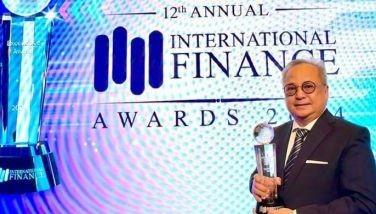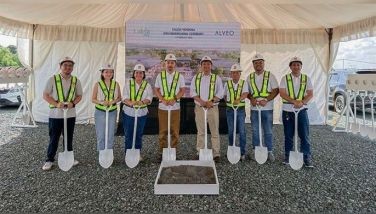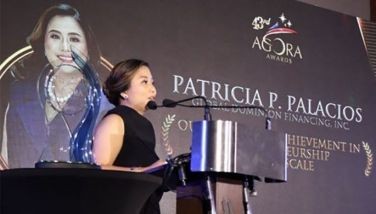Garbo sa Sugbo 2006: Leo Lastimosa on the frontlines of Fearless Journalism
September 13, 2006 | 12:00am
No profound achievement comes without obstacles. As a young boy growing up in Talisay, Leo Lastimosa is no stranger to adversity. "We were so poor that we were deprived of so many things," says Lastimosa, a son of a farmer and a public school teacher. Despite the scant family resources, he learned from his parents that hard work could transcend limitations. He nursed hopes of becoming a writer, diligently borrowing a typewriter from a favorite uncle.
His passion for reporting asserted itself early, and by the time he was finishing high school, he was writing for The Freeman. Lastimosa fondly remembers the day he handed an unsolicited article to TF publisher, Juanito Jabat, who in turn, wordlessly perused his submission written on yellow pad and in long hand. Much to his amazement, his byline appeared the next day, emboldening the lanky and painfully shy young man to pursue a career in journalism.
As a Political Science student-activist at USJ-R, he ventured into radio. "A classmate brought me to DYLA in December 1984. Cerge Remonde made me cover the campuses. My earliest reports were all about student protests in and out of Cebu's colleges and universities. When Edsa 1 erupted in 1986, I was hopelessly hooked to radio already. Those years saw me glued to the newsroom 24/7."
Those exciting, albeit tumultuous, years largely defined his broadcasting style. He later moved to DYRF, and in June 1995 when DYAB was launched, he was taken in by the station, appointing him as news director and giving him the weekly TV program "Banat Visayas, Sulong Mindanao." Last year, Lastimosa, now station manager of DYAB, acquiesced to the call of primetime daily newscast. He anchors "TV Patrol Central Visayas" with Atty. Haide Acuña.
Often described as low-key and reticent in person, Lastimosa, however, has proved to be a trusted and undaunted voice in the tri-media sphere for more than two decades now. His series of burning exposes even included "media mercenaries," condemning the practice of some colleagues to accept money during elections, among others. No doubt, his ascent to a distinguished media career could only be explained by a personal system of uncompromising values.
Leo Lastimosa talks to The Freeman on how it is to be on the frontlines of fearless journalism.
You're now one of the most recognizable faces in the province if not in the region. How does it feel to be treated like a celebrity? I will myself not to be conscious about it. I greet people if they recognize me in public places. I'm not comfortable yet when the young ones asked for autographs. But in most instances, people just wave and leave me alone.
As a tri-media journalist, which medium do you find most fulfilling, most challenging, and the one you think you could do without? Radio [is most fulfilling]. It's where I can be myself. I still need to improve the prose of my columns. I'm determined to write in English soon. I'm still not comfortable with TV.
Have you always been this fearless as a kid? We're poor so I started working while I was still in high school.
Most of my earnings came from my contributions to radio stations and local and national publications. My parents taught us to work hard. I was very independent when I was a kid. When I started working for radio in 1984, more and more people were defying the Marcos dictatorship. It wasn't so difficult for us young media practitioners to also start the status quo, the broadcast industry included. We had that sense of urgency and invincibility. My broadcasting style was molded during those exciting years.
What was the most serious death threat you have received and how did you deal with it? When I exposed a strafing incident involving Sogod Mayor Deo Durano in the early '90s, I was told by his boys that they're watching my every move, that they knew my schedule, that they'll kill me, and that they knew where my family lived. Those were not the happiest days of my life for sure but I survived and used the experience to withstand the more serious threats that followed. Several years later, it was Mayor Durano's turn to receive death threats-a life sentence-from the NPAs. I was among the very first ones who was allowed to interview him live on radio. A month or two ago, he asked me to help promote Sogod's job fair and I obliged.
Out of curiosity, is there something that would scare the wits out of a Leo Lastimosa? Fire. It can take away everything you have, including loved ones, in an instant. I was living in Pasil when a major portion of the barangay was gutted down by a huge fire in the early '90s. It spared my boarding house but left a paralyzing fear that stays with me until today.
What keeps you going? Media work is the only thing I know. So I had to be good at it. All of my employers have been very generous in giving me all the opportunities to grow. I owe them everything. I have a very supportive family. I have friends who understand the nature of my work. Most of all, I love to be with people. This work is giving me the chance to do the things I love most.
Just this year, you have received several awards recognizing your work, the most recent of which was "Garbo Sa Sugbo." What do these awards exactly mean to you? I dedicate all my awards to my parents. I consider these recognitions as proofs that I have not failed them. I always become emotional during awarding ceremonies because my childhood dream was just to hear my voice on radio and read my name on papers. I never expected to be amply rewarded. I am forever grateful.
Looking back, what has been your proudest moment in your life and career? It came while I was anchoring a radio program about the Comprehensive Agrarian Reform Program (CARP) in DYLA. One of our walk-in guests was my father (he's dead now). He traveled all the way from a farm that he was managing in Sagbayan, Bohol to ask his son a question about agrarian reform. I was so flattered and honored that I was afraid I failed to satisfactorily answer all his queries.
What do you think of today's Cebu, or Philippine media, in general? Is it making progress or not in terms of work ethics and values? The new technologies have made media work much easier. They can either raise the standard of excellence or make media practitioners more dependent and inefficient. The biggest beneficiaries of the new technologies are the media consumers. They are now a more active participant in the news process, and media practitioners have to listen to what people are saying or they'll become as irrelevant as yesterday's news. Cebu media has survived the repressive martial law years and the heydays of media mercenaries, I'm sure we'll also withstand the new challenges posed by the IT revolution.
Any advice for the younger generation of media practitioners? It's not a crime to dream big but you can only achieve your dreams by working hard-harder than anyone else. You have the whole world before you. Choose what you do best, learn the ropes, hone your craft, master your field and just follow your heart.
His passion for reporting asserted itself early, and by the time he was finishing high school, he was writing for The Freeman. Lastimosa fondly remembers the day he handed an unsolicited article to TF publisher, Juanito Jabat, who in turn, wordlessly perused his submission written on yellow pad and in long hand. Much to his amazement, his byline appeared the next day, emboldening the lanky and painfully shy young man to pursue a career in journalism.
As a Political Science student-activist at USJ-R, he ventured into radio. "A classmate brought me to DYLA in December 1984. Cerge Remonde made me cover the campuses. My earliest reports were all about student protests in and out of Cebu's colleges and universities. When Edsa 1 erupted in 1986, I was hopelessly hooked to radio already. Those years saw me glued to the newsroom 24/7."
Those exciting, albeit tumultuous, years largely defined his broadcasting style. He later moved to DYRF, and in June 1995 when DYAB was launched, he was taken in by the station, appointing him as news director and giving him the weekly TV program "Banat Visayas, Sulong Mindanao." Last year, Lastimosa, now station manager of DYAB, acquiesced to the call of primetime daily newscast. He anchors "TV Patrol Central Visayas" with Atty. Haide Acuña.
Often described as low-key and reticent in person, Lastimosa, however, has proved to be a trusted and undaunted voice in the tri-media sphere for more than two decades now. His series of burning exposes even included "media mercenaries," condemning the practice of some colleagues to accept money during elections, among others. No doubt, his ascent to a distinguished media career could only be explained by a personal system of uncompromising values.
Leo Lastimosa talks to The Freeman on how it is to be on the frontlines of fearless journalism.
You're now one of the most recognizable faces in the province if not in the region. How does it feel to be treated like a celebrity? I will myself not to be conscious about it. I greet people if they recognize me in public places. I'm not comfortable yet when the young ones asked for autographs. But in most instances, people just wave and leave me alone.
As a tri-media journalist, which medium do you find most fulfilling, most challenging, and the one you think you could do without? Radio [is most fulfilling]. It's where I can be myself. I still need to improve the prose of my columns. I'm determined to write in English soon. I'm still not comfortable with TV.
Have you always been this fearless as a kid? We're poor so I started working while I was still in high school.
Most of my earnings came from my contributions to radio stations and local and national publications. My parents taught us to work hard. I was very independent when I was a kid. When I started working for radio in 1984, more and more people were defying the Marcos dictatorship. It wasn't so difficult for us young media practitioners to also start the status quo, the broadcast industry included. We had that sense of urgency and invincibility. My broadcasting style was molded during those exciting years.
What was the most serious death threat you have received and how did you deal with it? When I exposed a strafing incident involving Sogod Mayor Deo Durano in the early '90s, I was told by his boys that they're watching my every move, that they knew my schedule, that they'll kill me, and that they knew where my family lived. Those were not the happiest days of my life for sure but I survived and used the experience to withstand the more serious threats that followed. Several years later, it was Mayor Durano's turn to receive death threats-a life sentence-from the NPAs. I was among the very first ones who was allowed to interview him live on radio. A month or two ago, he asked me to help promote Sogod's job fair and I obliged.
Out of curiosity, is there something that would scare the wits out of a Leo Lastimosa? Fire. It can take away everything you have, including loved ones, in an instant. I was living in Pasil when a major portion of the barangay was gutted down by a huge fire in the early '90s. It spared my boarding house but left a paralyzing fear that stays with me until today.
What keeps you going? Media work is the only thing I know. So I had to be good at it. All of my employers have been very generous in giving me all the opportunities to grow. I owe them everything. I have a very supportive family. I have friends who understand the nature of my work. Most of all, I love to be with people. This work is giving me the chance to do the things I love most.
Just this year, you have received several awards recognizing your work, the most recent of which was "Garbo Sa Sugbo." What do these awards exactly mean to you? I dedicate all my awards to my parents. I consider these recognitions as proofs that I have not failed them. I always become emotional during awarding ceremonies because my childhood dream was just to hear my voice on radio and read my name on papers. I never expected to be amply rewarded. I am forever grateful.
Looking back, what has been your proudest moment in your life and career? It came while I was anchoring a radio program about the Comprehensive Agrarian Reform Program (CARP) in DYLA. One of our walk-in guests was my father (he's dead now). He traveled all the way from a farm that he was managing in Sagbayan, Bohol to ask his son a question about agrarian reform. I was so flattered and honored that I was afraid I failed to satisfactorily answer all his queries.
What do you think of today's Cebu, or Philippine media, in general? Is it making progress or not in terms of work ethics and values? The new technologies have made media work much easier. They can either raise the standard of excellence or make media practitioners more dependent and inefficient. The biggest beneficiaries of the new technologies are the media consumers. They are now a more active participant in the news process, and media practitioners have to listen to what people are saying or they'll become as irrelevant as yesterday's news. Cebu media has survived the repressive martial law years and the heydays of media mercenaries, I'm sure we'll also withstand the new challenges posed by the IT revolution.
Any advice for the younger generation of media practitioners? It's not a crime to dream big but you can only achieve your dreams by working hard-harder than anyone else. You have the whole world before you. Choose what you do best, learn the ropes, hone your craft, master your field and just follow your heart.
BrandSpace Articles
<
>
- Latest
- Trending
Trending
Latest


















